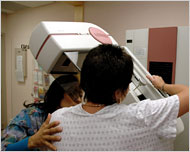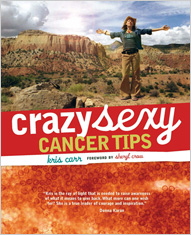So I admit that like most people, I have been obsessed with Dara Torres’s amazing 41-year-old abs. For those who haven’t been paying attention, Olympic swimmer Ms. Torres has become an iconic figure ever since a stunning Robert Maxwell photo of her appeared in The New York Times Magazine.
 Dara Torres and her abs. (Robert Maxwell)
Dara Torres and her abs. (Robert Maxwell)As my colleagues at the Rings blog have noted, Ms. Torres and her “phenomenally ripped” belly have become the “physical ideal for mothers, women at or approaching middle age, and just women in general.”
 Estelle Parsons, 80, at home. (Sara Krulwich/The New York Times)
Estelle Parsons, 80, at home. (Sara Krulwich/The New York Times)But I’m going to suggest a new candidate to represent the physical ideal for women, young and old and in the middle. As reported in today’s Times, Estelle Parsons, a star of the Broadway show “August: Osage County,” has been winning acclaim not just for her acting but for the high level of fitness her demanding role requires. What’s amazing is that she is 80.
While Ms. Torres has a head coach, a sprint coach, a strength coach, two stretchers, two masseuses, a chiropractor and a nanny, all at the cost of at least $100,000 per year, Ms. Parsons’s stamina is a tribute to a lifetime of simple physical fitness.
She lifts weights, swims 30 minutes twice a week and takes a 30-minute bike ride on two other days. She takes a break from exercise on Wednesdays and Saturdays, when she has two performances. She swims, hikes or bikes on her Mondays off work. She also cross-country skis and does yoga in her dressing room and at home whenever she gets a few minutes.
“I’ve always been a fit person,” Ms. Parsons said. “I’ve been acting all my life, and I’ve always felt you should be in shape. I’m used to devoting my whole life to the work and what it requires.”
To read more about this amazing woman, click here.
What do you think? Would you rather be a Dara or an Estelle?



















 Healthy living doesn't happen at the doctor's office. The road to better health is paved with the small decisions we make every day. It's about the choices we make when we buy groceries, drive our cars and hang out with our kids. Join columnist Tara Parker-Pope as she sifts through medical research and expert opinions for practical advice to help readers take control of their health and live well every day. You can reach Ms. Parker-Pope at
Healthy living doesn't happen at the doctor's office. The road to better health is paved with the small decisions we make every day. It's about the choices we make when we buy groceries, drive our cars and hang out with our kids. Join columnist Tara Parker-Pope as she sifts through medical research and expert opinions for practical advice to help readers take control of their health and live well every day. You can reach Ms. Parker-Pope at 

